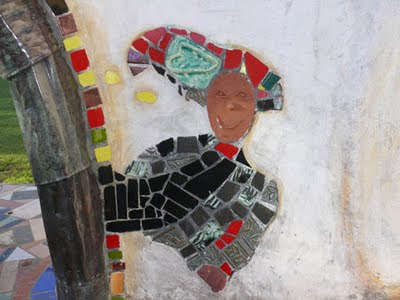Welcome to the sixth stop on
Readwritepoem's Virtual Book Tour.
I have to say that I found Lisa Ciccarello's chapbook
At Night, the Dead challenging to review. My poetry tastes tend towards what is often described as "accessible" although not too accessible. I found the sections of this book a little more mysterious and confusing than my usual poetic reading matter. If another member of my poetry group had brought them along, I would certainly be asking many questions - what do you mean here? I don't understand this. Why did you use this word?
The work is unusual in that it appears to be intended as a whole, since each section - apparently from the layout, a prose poem - has the same title. This is not the action of a poet who might publish any of them separately. The first starts with an air of menace -
You lock the door. You lock the window. You dream of the dead.Initially, the sense of the dead being a threat that is somehow not quite defined is what I took from the book. Then I read
Jill's review in which she says the dead love us. I went back to re-read and found that there too.
The dead need someone to smile atTheir love is
just a little series of lettersThe sections are full of very striking images. The moon is a plug to stopper the dark, it is a coin on the eye of the dead, it is an ember. The sky smells like tea.
There is a good deal of repetition. The dead, the moon, salt, coins, the dark. I feel the poems walk a fine line between being darkly obsessive and merely repetitive and boring. Sometimes they wobble a little, but never quite fall off the tightrope. In fact, on each re-reading, I notice details that I missed the first time, and they grow richer. In "accessible" poems, this happens less, because they offer a clear picture which we understand on first reading, and put all the pieces in place. With these poems which I find harder to understand, the mind at first rejects the details that don't fit the initial picture. Words change their meaning - salt appears to be symbolic, but what is it symbolic of? Does salting the sills keep the dead away, or does it feed the dead?
You salt the sills from the inside...
The dead...have no salt. Each one takes a grain of saltThe music of the poems also interested me. The sound does not always appear to flow smoothly. It is sometimes chopped up into many short sentences
A heart is just soil. Ask anyone. A heart is blinks. A long blink is a scream. A longer blink is sleep. All night a scream. There must be someone elseAt other times there are long sentences with many clauses in which it is difficult to find a place to take a breath.
Regardless, when certain fish then jumped their eyes were coins made luminous by the luminous coin of the moon which was part of the earth almost recently enough to still remember the heat.It is not that it is unmusical, but that to me it resembles modern music (modern "classical" music, that is, not "pop") - sometimes fragmented, sometimes discordant, not always easily singable but more exciting and compelling for its surprises.






















